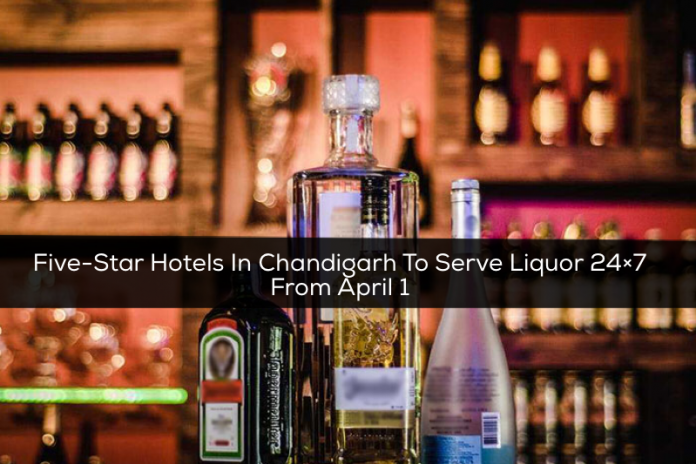Here is good news for booze lovers! The five-star hotels in Chandigarh will now serve liquor round the clock.
Announcing the excise policy for the next fiscal year 2020-21, the Chandigarh Administration has announced to allow five-star and above category, hotels to serve liquor round the clock and provide the facility of minibars for the rooms.
The move is aimed at promoting tourism. The five-star hotels in Chandigarh include JW Marriott, The Lalit, Mountview, Hyatt Regency, and Hotel Taj. As per the existing excise policy, bars in these hotels and at other restaurants were allowed to remain open till 1 am.
According to the city’s Hotel and Restaurant Association, President Arvinder Pal Singh, the rule should have been the same for all big or small hotels. If any hotel wishes to serve liquor round the clock, it should have been allowed at extra cost. The association had requested the administration to extend the timings for serving alcohol. But the policy favoured only five-star hotels.
The tipplers, however, would have to shell out more money for liquor from April onwards.
The excise policy 2020-21 states the following:
- Indian Made Foreign Liquor (IMFL): With the increase in excise duty of Indian Made Foreign Liquor, its price will be up by up to 10 percent in the city except on high-end brands.
- Basic quota: The basic quota of IMFL has not been increased. It is 100 lakh Proof Litre (PL). While basic quota of country liquor of 4 lakh PL has been increased to 8 lakh PL with 10 percent conversion into IMFL.
- Cow cess: Apart from this, cow cess will be levied on all categories of liquor, increasing its price from April 1, 2020. A new provision has also been added to the excise policy making it mandatory for all hotels and restaurants serving liquor to provide alcometers for a voluntary assessment of alcohol by consumers.
As per a senior officer of Chandigarh Administration, the cow cess will be levied at ₹5 per bottle (750 ml) of country liquor, ₹5 per bottle (650 ml) of beer and ₹10 per bottle (750 ml) of whiskey.
- The number of vends: Under the new excise policy, the number of licensing units has been increased from 92 to 95.
- Push towards beer: To promote low alcoholic contents beverages i.e. beer, wine and particularly to boost Indian Wine Industry, the license fee has not been increased and kept at ₹12000 for the whole year. Further, the label registration fee of wine has been reduced from ₹10000 per brand to ₹7500 per brand.
- Microbrewery: Furthermore, the excise duty of microbrewery has been kept the same at ₹30 per BL (bottled) to shift the consumers from hard liquor to soft liquor. Their license fees have also not been increased from the last year.
- License fee under GST Act: The license fee to promote the sale of imported and Indian wine, ready to drink and imported beer to be granted to the shops or establishments registered under Goods and Service Tax Act, 2017 has also been kept the same at ₹2 lakh.
- Push to departmental stores: Also, to promote the sale of liquor through departmental stores, no change has been made in the license fee of departmental stores. This is ₹20 lakh and there is no change in quota which is 3,000 Pl.
Revenue To Go Up 10%
He added that the excise policy for the year 2020-21 would help to earn revenue of about ₹680 crores in comparison with ₹617 crores estimated to be earned in the current fiscal year 2019-20. This would be an increase of approximately 10 percent over the year 2019-20.
News Source: Hindustan Times
Image Source: Google Images





















